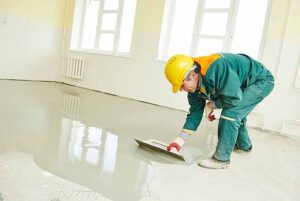 If you’ve ever noticed uneven floors, gaps between tiles, or doors that won’t close properly, it’s likely that your property’s foundation needs some attention. Floor leveling is a crucial process that helps rectify uneven surfaces, providing a stable base for various flooring materials. Whether you’re renovating your home or preparing it for new flooring installation, hiring a professional floor leveling contractor can make all the difference. In this article, we’ll explore the importance of floor leveling, the key benefits of hiring contractors, and the process involved in achieving a level and flawless foundation.
If you’ve ever noticed uneven floors, gaps between tiles, or doors that won’t close properly, it’s likely that your property’s foundation needs some attention. Floor leveling is a crucial process that helps rectify uneven surfaces, providing a stable base for various flooring materials. Whether you’re renovating your home or preparing it for new flooring installation, hiring a professional floor leveling contractor can make all the difference. In this article, we’ll explore the importance of floor leveling, the key benefits of hiring contractors, and the process involved in achieving a level and flawless foundation.
The Significance of Floor Leveling
A level floor is essential for the structural integrity and longevity of any building. Uneven floors not only lead to cosmetic issues but can also cause serious safety hazards. They can result from various factors, including settling of the building’s foundation, poor construction, or simply wear and tear over time. Regardless of the cause, addressing uneven floors is crucial to prevent further damage and ensure a smooth and aesthetically pleasing surface.
Why Choose Professional Floor Leveling Contractors
1. Expertise and Equipment
Professional floor leveling contractors have the expertise to identify the underlying causes of uneven floors and employ the right techniques to correct them. They use advanced equipment and leveling compounds to achieve precise and long-lasting results.
2. Tailored Solutions
Every property is unique, and a one-size-fits-all approach won’t work for floor leveling. Contractors assess the specific requirements of each project and develop customized solutions to address the floor’s irregularities effectively.
3. Time and Cost Efficiency
Attempting floor leveling as a DIY project can be time-consuming and may lead to costly mistakes. Professional contractors work efficiently, saving you time and money in the process.
4. Ensuring Flooring Durability
Properly leveled floors create a solid foundation for various flooring materials, ensuring that they adhere securely and remain durable over time.
5. Enhancing Property Value
A level floor not only improves the appearance of your property but also enhances its value. Whether you plan to sell or stay, a well-leveled floor is a significant asset.
The Floor Leveling Process
1. Inspection and Assessment
The first step in floor leveling is a comprehensive inspection of the floor’s condition. Contractors assess the extent of unevenness and determine the best approach for correction.
2. Surface Preparation
Before leveling compounds can be applied, the floor must be thoroughly cleaned and free of any debris or loose materials. This ensures a strong bond between the leveling material and the existing floor.
3. Application of Leveling Compounds
Contractors apply self-leveling compounds or other appropriate materials to even out the floor surface. These compounds flow and settle into the low areas, creating a smooth and level base.
4. Curing and Drying
Once the leveling compounds are applied, they need time to cure and dry. This process usually takes a few hours to a few days, depending on the product used and environmental conditions.
5. Final Inspection
After the leveling compounds have dried and cured, contractors conduct a final inspection to ensure that the floor is perfectly level and ready for the installation of the chosen flooring material.
Floor leveling is a critical step in maintaining the integrity and aesthetics of your property’s foundation. Uneven floors can lead to a host of issues and pose safety risks. Hiring professional floor leveling contractors ensures that the process is done efficiently and accurately, providing you with a level and stable foundation for your flooring materials. So, if you’re considering new flooring installation or want to address uneven floors, don’t hesitate to seek the expertise of experienced floor leveling contractors to achieve a flawless and durable result.
FAQs
Q1: Can floor leveling fix all types of uneven floors? A1: Floor leveling can address most types of unevenness, but the extent of correction depends on the severity and underlying causes. Professional contractors can assess the situation and provide appropriate solutions.
Q2: Is floor leveling a messy process? A2: No, floor leveling is a relatively clean process. Contractors take precautions to contain dust and debris during the application of leveling compounds.
Q3: How long does the floor leveling process take? A3: The duration of the floor leveling process varies depending on the size of the area and the extent of unevenness. On average, it may take a day or two to complete the leveling and drying process.
Q4: Can floor leveling be done on all types of flooring materials? A4: Yes, floor leveling is compatible with various flooring materials, including tiles, hardwood, laminate, and vinyl. It ensures a smooth and stable base for any type of flooring.
Q5: Is floor leveling a DIY-friendly project? A5: Floor leveling requires specialized knowledge, tools, and materials. It is best left to professional contractors to ensure accurate and long-lasting results.

